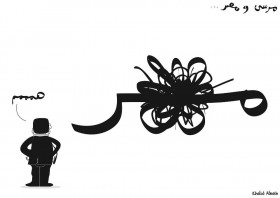 Calling for the ouster of President Mohamed Morsi and for early elections on 30th of June, the Tamarod campaign has gathered with the simplest means two million signatures so far and goes for 15 million by the end of the month. It shows: Resistance adapts and its means evolve.
Calling for the ouster of President Mohamed Morsi and for early elections on 30th of June, the Tamarod campaign has gathered with the simplest means two million signatures so far and goes for 15 million by the end of the month. It shows: Resistance adapts and its means evolve.
Since the massive and euphoric revolution in 2011, which a lot of Egyptians considered at that time the difficult beginning of an easier democratization process, perspectives have changed and protest became more serious and enduring, facing every day the proliferating leftovers of a beheaded regime. The latest Tamarod rebellion movement is another attempt of creative civil resistance in Egypt, that has become more inventive, imaginative and dynamic ever since the beginning.
Egypt seems currently stuck in a bizarre and pale socio-political limbo, between democratic heaven and the hell of civil war. Electricity cuts, eroding Egypt‘s everyday rhythm and fatally interrupting operations in hospitals, embarrassing slip-ups of major political officials live on air, addressing military action on the count of Ethiopia‘s latest dam project and shady sentences against NGO activists, obviously being in line with a larger agenda, regularly suggest the impotence of the current government and its lack of constructiveness. Meanwhile the situation in Sinai where arms trade, antiquity smuggle and Bedouin-gang kidnappings are flourishing gets/is becoming more insecure, regularly evoking images of noble, rival tribes as in James Lean‘s motion picture „Lawrence of Arabia“, rather than those of a strong nation state and a just democracy. In a weak attempt of showing strength President Morsi sent dozens of tanks and hundreds of soldiers to Sinai – a superficial show of force in the face of unknown gunmen.
While politicians are lethargically facing the stressful, bureaucratic processes of democracy and its annoying duties, while desperately try to make the political sphere, since 2011 stuck between a stubborn and clumsy Muslim Brotherhood, a meticulous Salafi party and an unproductive, holier-then-though opposition – again all detached from the needs of civil society – more coherent, independent social movements seem often more efficient and resolute.
The latest bottom-up campaign works. Calling for the ouster of President Mohamed Morsi and for early elections on 30th of June, the Tamarod campaign has gathered with the simplest means two million signatures so far and goes for 15 million by the end of the month. “Because security has not returned, because the poor have no place, because I have no dignity in my own country… we don’t want you anymore”, its text states and sends a clear message to the current President in office and to the Muslim Brotherhood. Their tenure has for months been marked by severe economic crisis, political turmoil and deadly protests.
And the campaign‘s voice has been heard. Last Thursday their headquarters have been attacked by unknown men with Molotov cocktails, injuring Hassan Shaheen, their media spokesman. Sakina Fouad, vice president of the Democratic Front Party, said that the government‘s fear of the crowds on June 30th, was pushing it to pressure the youth campaign, that was able to mobilize people for a second revolution, through intimidation and panic, in order to make them cancel the announced demonstrations. Systematic violence against activists was lately repeated in the exact same way on different occasions.
Syed Abdul Ghani, Deputy Chairman of the Arab Nasserist Party, stated that violence is not a new mean to the Muslim Brotherhood. „They were using it since the 1970‘s and they now assault the headquarters of the rebel campaign in order to destroy people‘s signatures, as they could reveal a lack of confidence in the President. But this will have no impact on the June 30th demonstrations.“
At the same time, the campaign seems to be a statement of continuous social resistance, in the face of a static, established political system that lacks channels and opportunities for opposition. Its rigid forms are confronted with a flexible series of dynamics that continues to radically question and even topple the status quo. Without masks, stones and tents, this time resistance is channeled through signatures.
Such movements will not stop to sprout off Egypt‘s fertile post-revolutionary socio-political sphere – politically lethargic and socially explosive – until politics are more coherent, gaps are abrogated and minorities included.
A next chapter might begin on June 30th.
